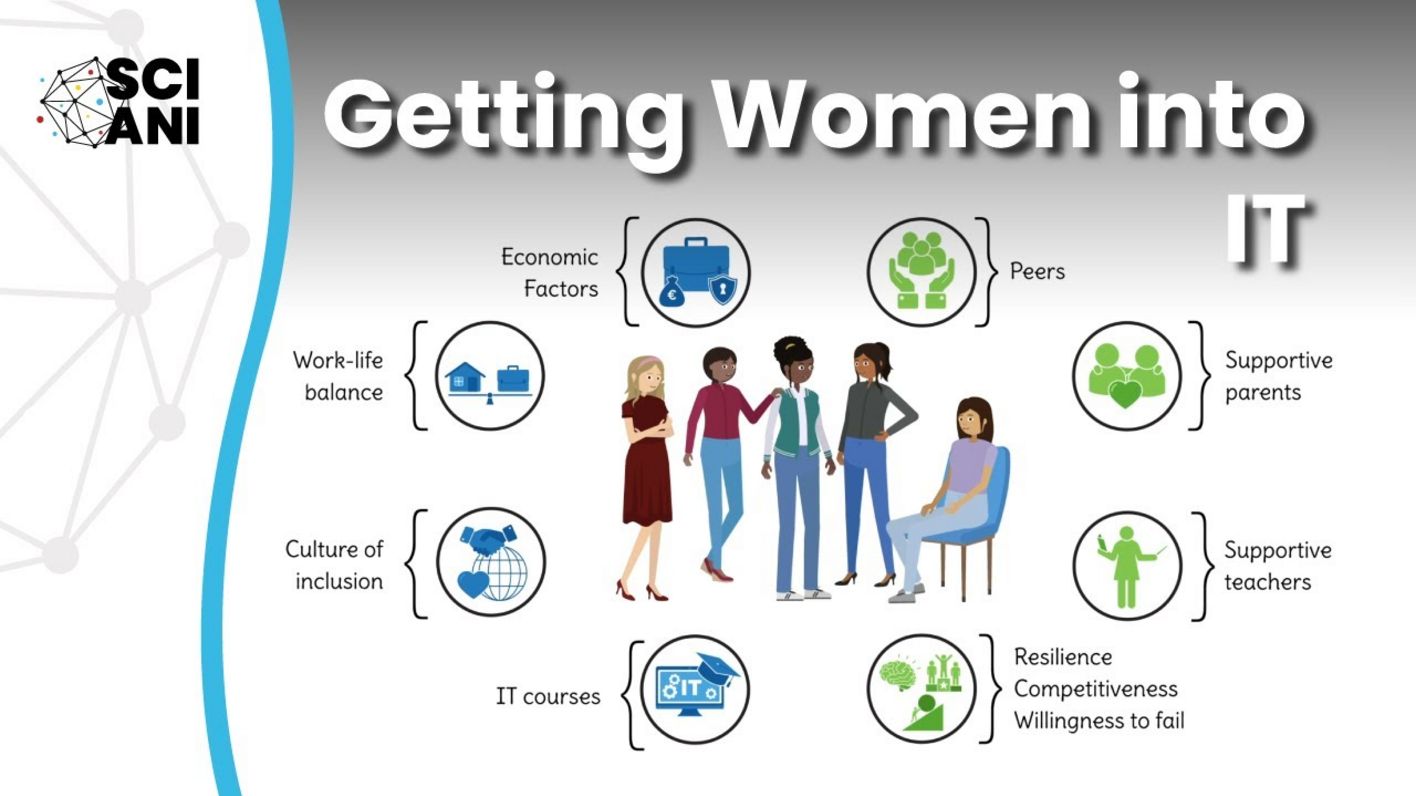Factors influencing women’s participation in IT degrees
Through interviews with IT students, we found that women’s decisions to enroll in IT degree programs are influenced by individual factors (e.g., family, friends, teachers) and environmental factors (e.g., economic aspects, culture, availability of IT courses in high school, work-life balance). Once enrolled, women found personal characteristics such as confidence, self-determination, and the ability to stand for themselves useful throughout the degree program. In addition, some women reported finding mentorship, role models, and a sense of belonging in the Women in CS group.

Focus Group: Diversity in Information Technology
Prof. Andreea Molnar (Swinburne University of Technology), Alumna Anna Boyksen Fellow (funded as part of the Excellence Strategy of the federal and state governments) | Host: Prof. Anne Brüggemann-Klein (TUM)
Motivation
Despite increasing awareness and efforts to attract women to computing, they are still poorly represented in information technology (IT) careers [1]. The number of females graduating with an IT degree has consistently declined since 1984, when women were 34 % of computer science graduates; women currently account for less than 20 % of IT graduates in many countries [2]. In Germany, the percentage of women who graduate with a bachelor’s degree in ICT was 19.6 % in 2018 [3], an increase from 10 % in 2000 [4] – however, this number is still low.
This lack of diversity in IT has repercussions for organizations and society. IT companies struggle to find a sufficiently skilled workforce, and increasing women’s participation is a focus of attention [5]. While many approaches have been tried, progress has been slow.
This project aimed to identify and characterize initiatives that promote IT among female school students in Germany. It also aimed to take into account personal factors of influence, such as values, identity, and life mission.
Findings
During the project, we conducted interviews with students enrolled in IT degrees at TUM [6, 7]. Our research revealed that early exposure to IT can spark initial interest. This could be through exposure to programming in high school or different initiatives. In particular, among the programs run by TUM, women mentioned StudiumMINT (https://www.tum.de/en/studies/degree-programs/detail/studium-mint-certificate-zertifikat) in interviews as one of their early exposures to IT and as a motivation to enroll, as the quote below highlights:
“I did the StudiumMINT here at home just to get an overview of the possibilities, and I saw there were lectures that we could attend on games engineering, and that was the first time I even considered computer science.”
However, apart from initiatives, a combination of other factors can influence women's decisions, including financial incentives for the foreseen jobs, perceived work-life balance, and social support. The role of family, friends, and IT high school teachers cannot be overstated. Additionally, personal attributes such as resilience empower women to overcome challenges and pursue their IT aspirations.
After they enroll in IT degrees at TUM, women credit the Women in CS group for helping them find a supportive community, a sense of belonging, and role models. Women also credit personal characteristics such as confidence, self-determination, and assertiveness as being important for succeeding in their degrees.
Figure 1
Recommendations
On the basis of the results, we provided the following recommendations:
Information about courses should be easily accessible – we found out that some women only discover their interest in the field upon learning more about specific programs. This information can be disseminated through university websites, initiatives aiming to promote IT for high school students or as a career, and IT teachers.
Initiatives should prioritize programming experiences and opportunities to interact with university faculty. In addition, recognizing the crucial role parents play in shaping their children's career paths, involving parents in these initiatives could be beneficial for attracting more women to the field. After women enroll in the courses, initiatives that could help them find a supportive community and that introduce them to role models are useful for retention.
IT courses available in high school or earlier familiarize women with the field and might demystify some of the views of the IT field. However, when these courses are running, it is important to address unconscious biases among teachers, through training. In addition, care should be taken to ensure that these courses will not be a further alienating experience for women due to the low number of women attending.
Plans and suggestions for future research
The study was conducted with a limited sample of participants from TUM, and a larger sample is needed before the findings can be generalized. We are currently collecting data to compare the findings with UK and Bangladesh.
In close collaboration with Julia Pühl and Carine Khalil (TUM).
[1]
NSF Science and Engineering Indicators. National Science Foundation (2018). Retrieved 15 December 2024 from https://nsf.gov/statistics/ 2018/nsb20181/report
[2]
Fatourou, P., Papageorgiou, Y. & Petousi, V. Women are needed in STEM: European policies and incentives. Communications of the ACM, 62(4), 52-52 (2019).
[3]
Catalyst Women in Science, Technology, Engineering, and Mathematics (STEM): Quick Take (2020). Retrieved 8 November 2020 from www.catalyst.org/research/women-inscience-technologyengineering-and-mathematics-stem
[4]
UNESCO. UNESCO science report: towards 2030 (2015). Retrieved 8 November 2020 from https://unesdoc.unesco.org/ark:/48223/pf0000235406
[5]
Kiely, G. L., Heavin, C. & Lynch, P. Building a shared understanding of female participation in IT through collaboration: A shared mental model approach. Journal of the Midwest Association for Information Systems, Vol. 1, (2019).
[6]
Molnar, A., Khalil, C. & Brüggemann-Klein, A. (2024).
[7]
Molnar, A. & Brüggemann-Klein, A. (2024).
Selected publications
- Molnar, A., Khalil, C. & Brüggemann-Klein, A. Factors influencing young women to enroll in IT. Gender Inequality-Issues, Challenges and New Perspectives. IntechOpen (2024).
- Molnar, A. & Brüggemann-Klein, A. What keeps woman in IT degrees. IEEE Integrated STEM Education Conference (ISEC), 01-04 (2024).
- Molnar, A. Exploring ethical considerations on using generative AI among University Computer Science students with focus on diversity. General Aspects of Applying Generative AI in Higher Education, Cham: Springer (2024).
- Stoilescu, D. & Molnar, A. Exploring educational settings and projects for a balanced gender representation in undergraduate information technology education. Teaching Information Systems, Edward Elgar Publishing, 136-158 (2024).
- Molnar, A. & Stoilescu, D. Diversity initiatives for woman in IT: friends or enemies? IEEE Technology and Society Magazine 42 (3), 33-36 (2024).
